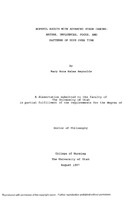Hopeful adults with advanced stage cancer: nature, influences, focus, and patterns of hope over time
View File(s)
- Author(s)
- Details
-
Mary Anne Hales Reynolds, PhD, RN, ACNS-BC
- Sigma Affiliation
- Nu Nu
Visitor Statistics
Visits vs Downloads
Visitors - World Map
Top Visiting Countries
| Country | Visits |
|---|
Top Visiting Cities
| City | Visits |
|---|
Visits (last 6 months)
Downloads (last 6 months)
Popular Works for Reynolds, Mary Anne Hales by View
| Title | Page Views |
|---|
Popular Works for Reynolds, Mary Anne Hales by Download
| Title | Downloads |
|---|
View Citations
Citations
The diagnosis of terminal cancer begins one of the most complex and challenging individual experiences of human life that requires multiple coping responses, one of those being hope. There are limited knowledge and few studies that provide descriptions of hope over time for adults, ages 20-59, with advanced stage cancer. The purpose of this study was to describe hope as defined and experienced by adults with advanced stage cancer, evidencing high levels of hope. This descriptive, longitudinal research study used the technique of methodological triangulation (semistructured interview, Stoner Hope Scale, Ferrans & Powers Quality of Life Index, Visual Analogue Scales, and participant observation) to define and describe hope in a convenience sample of 12 hopeful adults with advanced stage cancer. Data were collected over time once a month for 3 months. By definition, this population exhibited high levels of hope at study entry. Hope scores did not change over time. Four qualities associated with the nature, influences, focus, and patterns of high levels of hope were identified: reliance on strong spiritual beliefs, maintenance of positive attitudes, accommodation of cancer symptoms, and the presence of supportive resource people. The emphasis or importance of each quality was determined and defined individually. Important in this study's findings is that hope goals are individually defined and are unique to the patient population, influenced by the phase of the illness and the developmental stage of the individual. Hope goals also vary in degree of expectancy and concreteness and require reassessment as conditions change. By identifying an individual's hope goals, nurses can then plan and implement interventions to move toward that hope goal.
This dissertation has also been disseminated through the ProQuest Dissertations and Theses database. Dissertation/thesis number: 9738992; ProQuest document ID: 304376724. The author still retains copyright.
This item has not gone through this repository's peer-review process, but has been accepted by the indicated university or college in partial fulfillment of the requirements for the specified degree.
| Type | Dissertation |
| Acquisition | Proxy-submission |
| Review Type | None: Degree-based Submission |
| Format | Text-based Document |
| Evidence Level | Other |
| Research Approach | Qualitative Research |
| Keywords | Hope in Cancer Patients; Advanced Stage Cancer; Mental States |
| CINAHL Subject(s) | Cancer Patients; Hope; Terminally Ill Patients; Cancer Patients--Psychosocial Factors; Terminally Ill Patients--Psychosocial Factors |
| Grantor | The University of Utah |
| Advisor | Mooney, Kathleen H. |
| Level | PhD |
| Year | 1997 |
All rights reserved by the author(s) and/or publisher(s) listed in this item record unless relinquished in whole or part by a rights notation or a Creative Commons License present in this item record.
All permission requests should be directed accordingly and not to the Sigma Repository.
All submitting authors or publishers have affirmed that when using material in their work where they do not own copyright, they have obtained permission of the copyright holder prior to submission and the rights holder has been acknowledged as necessary.
Related items
Showing items related by title, author, creator and subjects.
-
The moderating effect of religion on death distress and quality of life among Christian cancer patients in the United States with Muslim cancer patients in Saudi Arabia
Almostadi, Doaa Abdullah A.Cancer is an illness that knows no international boundaries. There are more than eight million global cancer deaths each year. A life-threatening diagnosis generates significant emotional problems for many patients across ... -
Patterns of fatigue and factors influencing fatigue during adjuvant breast cancer chemotherapy
Berger, Ann M.Women beginning adjuvant chemotherapy for breast cancer seek information from health professionals regarding fatigue, but knowledge regarding this distressing symptom is currently limited. The purposes of this study were ... -
A qualitative study of hope and the environment of persons living with cancer
Tipton, Lucia M.The purpose of this naturalistic study was to explore and describe the impact of factors from the internal and external, human and non-human environments on the hoping process utilized by persons living with cancer. Given ... -
How did advanced pancreatic cancer patients and caregivers communicate their needs?: A pilot study
Tang, Chia-Chun; Von Ah, Diane; Shields, Cleveland (2016-09-16)Session presented on Sunday, September 18, 2016: Background: Although it is one of the leading causes of cancer deaths in the United States, little is known about how patients with advanced pancreatic cancer and their ... -
Influence of personal and contextual factors and cognitive appraisal on quality of life over time in persons newly diagnosed with cancer
Kessler, Theresa A. (2013-10-22)Session presented on: Tuesday, July 23, 2013: Purpose: As cancer treatment has become more successful, measurement of outcomes focusing on quantity, such as disease free survival, mortality, and cancer relapse rates, are ...





